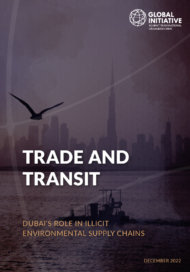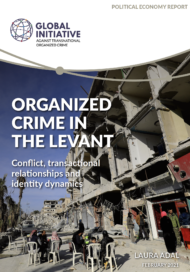Posted on 27 Jan 2023
Oil has long had a major influence on organized crime dynamics in the Middle East, with Saudi Arabia and Iran playing leading roles. From sanction-evading smuggling to the funding of criminal activities with oil proceeds, the two regional giants employ different strategies in leveraging their vast natural resources to gain the upper hand in a longstanding power struggle, consequently impacting illicit markets and flows in the tumultuous region. With Russia’s invasion of Ukraine, the issue of oil and other fossil fuels has heightened the stakes in the region’s geopolitical and organized crime landscape.
In May 2022, the United States imposed new sanctions on Iran after an international oil smuggling and money laundering ring was revealed, linked to Russia and led by the notorious Iranian Revolutionary Guard Corps Quds Forces (IRGC-QF) – the foreign espionage and paramilitary arm of Iran’s Revolutionary Guards that controls its allied militia abroad. According to the US Department of the Treasury, the smuggling network facilitated the sale of ‘hundreds of millions of dollars’ worth of oil’ for the IRGC-QF and its allies, including Hezbollah in Lebanon.
Iranian sanctions are not something new. Until Russia invaded Ukraine in February 2022, Iran was the most sanctioned country in the world, often tied to developments regarding the Iran nuclear deal. Since former president Trump withdrew from the nuclear deal in 2018, the US has reimposed sanctions and added an array of new ones. Between 2017 and 2021, the Trump administration imposed more than 1 500 sanctions, followed by more than 100 since President Biden took office.
But sanctions are well known to have criminalizing effects, and Iran adapted to the sanctioning. Oil smuggling has seemingly become an economic strategy by Iran to evade Western restrictions, with regular reports of Iranian ships being disguised and discreet ship-to-ship transfers carried out. For example, according to the advocacy organization United Against Nuclear Iran, in March 2022, Iran illegally exported at least 900 000 barrels per day, mostly to China. In November, it was reported that a global web of shell companies and vessels from Switzerland to Singapore used fraudulent tactics as part of a scheme to blend and export sanctioned Iranian oil.
Iran has also been known to smuggle vast reserves of oil to many of its neighbours. Despite living in a region that produces about a third of the world’s oil, many citizens in the Middle East struggle to get enough fuel to meet their needs. Oil smuggling is a thriving business in the region, where some oil-producing countries have subsidized fuel products to support their populations. Although fuel subsidies are characteristic of the region as a whole, Iran is among its most prominent players. Between 2010 and 2020, the country was identified as having the largest share of global explicit fossil fuel subsidies, at 22 per cent.
Beyond the well-documented environmental and socio-economic problems that fuel subsidies pose domestically, price discrepancies between different countries are a key vulnerability that criminal actors along oil and gas supply chains take advantage of by smuggling oil across borders, exacerbating fuel shortages and economic disparities. Iran, which has some of the world’s lowest fuel prices due to these subsidies and the plunging value of its national currency amid Western sanctions, has regularly been accused of rampant fuel smuggling to its neighbours in cooperation with regional allies, such as Hezbollah. Reportedly, Iran sends crude oil to Lebanon through Syria.
Strategy and geopolitics
Like everything else in the Middle East, geopolitics also impacts oil smuggling. With Russia now rising to first place as the most sanctioned country in the world and with resumed talks for a possible agreement on the nuclear deal, Iran may be well placed to use its expertise in sanction-evading smuggling to come to Russia’s aid while bolstering its role in the Middle East.
Recent reports suggest Russia has set its targets on Iran to help clandestinely ship oil to circumvent its sanctions and help keep its economy and war coffers afloat. This would be in a so-called ‘swap’ arrangement, whereby Iran would import and refine Russian crude oil, and ship it from the Persian Gulf in Iranian tankers that, thanks to a possible agreement on the Iran nuclear deal, would be exempt from sanctions. In return, Iran would benefit from Russian investment and cooperation in boosting military technology, posing a threat to its greatest regional rival, Saudi Arabia.
Saudi Arabia and Iran have been entrenched in a rivalry that spans more than three decades, shaping the political and economic profile of the Middle East. This regional ‘cold war’ is fuelled by fuel, where profits from oil sales, both licit and illicit, are most obviously manifested in support for proxy actors in neighbouring countries such as Yemen, Syria and Lebanon. This comes in different forms – from military support and humanitarian aid to smuggling weapons and oil.
Although Iran’s illicit oil activities are happening in plain sight, Saudi Arabia has shown to be more discreet in leveraging its oil supplies. For example, it intervened in the Syrian conflict by funding anti-government rebels with millions of dollars and weapons using its oil wealth. In turn, these groups have been known to engage in a wide range of criminal activities within the territories they gained, from extortion practices in local communities to smuggling illicit goods, including drugs and oil. The Saudi Kingdom’s approach can be described as political weaponization of its reserves, with criminal effects.
Possessing around 17 per cent of the world’s proven oil reserves, Saudi Arabia has arguably the most to gain from Russia’s invasion of Ukraine and some leverage in its ongoing rivalry with Iran. The war in Ukraine increased oil prices globally from US$76 per barrel in January 2022 to over US$110 per barrel in March. As a leader in the Organization of the Petroleum Exporting Countries Plus, an expanded group of 23 oil-exporting countries – including Russia – who decide how much crude oil to sell on the world market, Saudi Arabia has refused to increase oil production, keeping supply limited and consequently maintaining high global oil prices.
In doing so, the country appears to have shunned the US – on whom it relies heavily for military support against the Iranian threat but is perceived to have lost interest in the region – and has hedged its bets on Russia, as high oil prices help fund its war in Ukraine. Although this move places Saudi Arabia in the same camp as its rival, Iran, the Kingdom now has the means to renegotiate its strategic relationship with the US and pursue political gains in places such as Yemen, where Iranian-backed Houthis have repeatedly attacked Saudi oil sites.
Beyond these global political implications, keeping fossil fuel prices high means that fuel is less accessible to citizens, placing a particular burden on low-income populations. From subsidies to sanctions, inequalities in accessibility can lead to a rise in organized crime, as criminal groups can step in to divert fuel supplies, smuggle them across borders and sell them at lower prices. For populations in import countries, hours-long queues at petrol stations in Beirut, Damascus and elsewhere mean there are few options but to turn to other sources, including illicit ones.
This analysis is part of the GI-TOC’s series of articles unpacking the role of oil in organized crime in Western Asia. The series explores, from a regional perspective, how oil smuggling is influenced by broader geopolitics, the effects it has on local dynamics throughout illicit supply chains and its wider global impact. Sign up to our Western Asia mailing list.



